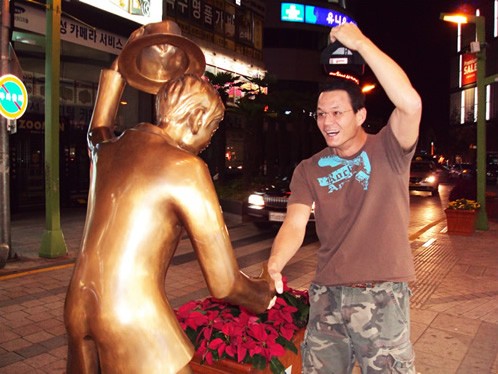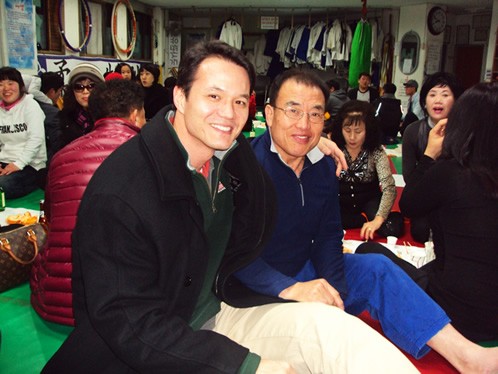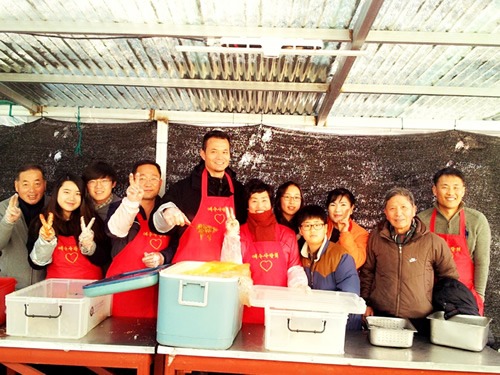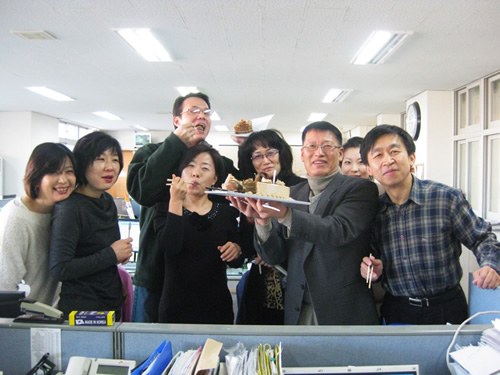The Guide to Teaching English and Living in South Korea
Own Your ESL Adventure
Article and Photos by Tom Gates
Have you heard that you can go live in South Korea and get paid to do so? The main requirement is that you have to be born. That's right. If you are from a native English-speaking country, you can get paid to live in the country for a year, teaching school children how to speak the very language of your birth better. It would be best if you also graduated from college, but that's another topic. In this electronically intertwined world, I'm sure many of you know this great way to travel and see different parts of the world for an extended period.
Living and teaching English in South Korea invokes different images to different people. It is a fantastic country with an incredible story, including how it rose from the ashes of a civil war to become a global economic player in an unmatched time frame. To be part of it all, during what might be the pinnacle of their story, is an incredible opportunity.
My 5-year experience in South Korea was a mixture that included many ups and downs.
Still, it ultimately blossomed into something completely different than you might imagine. Living as an English teacher in the country is what you make of it: part lifelong memories, part new friends, and part personal growth.
 Welcome to South Korea!
Welcome to South Korea!
|
I was an IT professional for 13 years before the financial collapse of 2008-09. I looked at the disenchantment and instability of my "career" during this period. I decided to do a proverbial sky-dive with my life. Little did I know that would be the single most significant decision I had made in many years.
Using English instruction as a vehicle is a great way to make living abroad a reality. It's also a fantastic career choice for many. You can gain priceless teaching experience, pay off debts, or save money for travel. That said, the value of money is all about your needs, and not everyone will see teaching in South Korea as a great option. Or maybe you'll see it as a temporary getaway. For those who think it may be something they want to do long-term, you may be wondering if Teaching English in Korea is Worth It Financially. The answer to that question comes down to the individual. I've made more money in my life doing other jobs, but there is no question that I am much happier now and live with a great sense of fulfillment.
You may be wondering how you might follow this path as well. Believe it or not, the easy part is finding a job. The challenge comes with learning how to assimilate to new ways of life in South Korea. It is precisely by breaking through culture shock that enjoyable moments and memories are possible. Not everyone approaches teaching in South Korea in the same way. Many have different motives that color their experiences. Here is my advice on some ways to enjoy South Korea that made all the difference for me and maybe for you.
Make the Most of Your Time Living and Teaching in South Korea
Discovering the "gems" that the country offers can't be found online or in K-dramas and are only truly revealed through other Koreans.
Try to be involved with activities where Koreans wouldn't expect to see foreigners. Locals will let their guard down and share the heart of Korea with you more because you'll be in their host environment. Trying on hanboks or making kimchi is often a service to foreigners, so locals regard it as such and accommodate accordingly. Going into their surroundings, you're conversely obligated to adapt to the most private aspects of their culture. Koreans will appreciate your respect, and you'll get more from the overall experience. Try to make more Korean friends than expat and foreign friends. Sounds romantic, but it can be challenging to achieve. Here are some activities I engaged in during my stay that helped me appreciate Korea's people, culture, and way of life more deeply.
Study a Martial Art
Don't take a martial art for any Zen reason or to learn how to end someone's life quickly and silently. Taking a martial art is an organic, culturally specific way to get to know Koreans and the role martial arts play in their lives. By contrast, going to a bar or a language exchange is an environment where Koreans will be slightly nervous, acting in a manner they believe is appropriate. A martial arts class is where many locals would habitually go to be part of their culture to make friends and carry on the ancient traditions in a region of the world where most styles originated.
Training in South Korea highlights the role of Asian martial arts as contrasted to the West. Martial arts in South Korea are part of daily life. Routine. Structure. Curriculum-based styles. All have cultural roots and significance. The arts promote social welfare and build bridges. The Martial arts are even an extension of school in some cases. The interest in a variety of styles is also shared with Japan, a nation with whom some friction still exists. Martial arts brings the two countries together and encourages connection. The same may be true for you. It was for me.
|
A "Cinderella Story"
I had just arrived in Busan, Korea, and was coming home from my first grocery shopping trip. In the cab, I conjured up the bravery to piece together some Korean words I learned and asked the cabbie where to find a judo school. While we sat at a red light, he pointed up at a building; sure enough, it was a judo school just blocks from my apartment. The owner of the school, who was 64 years old at the time, functions with the force of a powerful machine. Even at his age, he could do exercises that would bring most 25-year-olds to tears. I immediately knew I was witnessing something unique, so I posted a video of the man doing these exercises on YouTube. The video quickly went viral in the fitness and martial arts communities. Wouldn't you know that it also made its rounds in Korean social media and caught the eye of a national variety show in Seoul called "Cinderella Story"!
The station contacted me at the school where I was working and said they wanted my judo master to come and be a guest on the show. Their feature showcased individuals in Korea with inspiring stories. So they brought him to Seoul, where he was on national TV. He accidentally grabbed the male show host's private area when demonstrating a technique! It was a "laugh out loud" accident that captured the public's imagination.
It was a great moment to know that one simple accidental act catapulted my instructor into the national spotlight, from sitting in the same dojo for 30+ years to becoming a judo legend and a kind of Korean hero. It is one of the greatest spontaneous highlights of my time in Korea.

Author with his dojo Master in South Korea.
|
|
Volunteering in South Korea
Certain types of volunteering occur in environments where the average South Korean may not expect to see a foreigner. Volunteering sheds a highly positive light on you to locals since you demonstrate a strong desire to step forward and assist where needed. I volunteered at a local homeless outreach in Busan for four years. It was a great facility that provided food and shelter to those in need several times per week. Avoid coming across as someone gracing their presence; instead, as someone grateful they're not in the same situation and want to give back. You will make many meaningful relationships with a different part of South Korean society.
 Volunteering with locals, the salt of the earth.
Volunteering with locals, the salt of the earth.
|
Eat with Koreans
Eating with Koreans is an excellent idea for a couple of reasons. First, you'll discover many traditional foods that Koreans eat that you would otherwise not learn about through foreign friends. Second, eating with someone is a sure way to learn more about each other. It is impossible to express or quantify how many insights I learned about navigating the ups and downs of local life by breaking bread with the people. It should be a regular ritual to take opportunities outside of teacher dinners to eat with the folks who make up the country. They will show you the ropes and help you enrich your life in South Korea.
Explore South Korea
Most foreigners do get out to see many parts of the country. It's great to see the big cities like Seoul and Busan, but visiting the smaller towns is also enjoyable. Because South Korea is changing, you can observe the old juxtaposed with the new, a unique feature of the country. South Korea is a relatively small nation, so getting around is easy. To go from Seoul to Busan is only a 3½ hour ride on the high-speed rail, KTX. The train goes through many places you should try to visit, including Gwangju, Daejeon, and Gyeonggi-do.
 Tom at the Jogyesa Temple in Seoul.
Tom at the Jogyesa Temple in Seoul.
|
Learn the Language in South Korea — or at Least Try
Learning the Korean language, even to a small degree, will pay dividends. It will help you survive day-to-day life. It may help you meet a girlfriend or boyfriend. Most importantly, it shows South Koreans that you are willing to go out to meet them rather than expecting the opposite. South Koreans know we are their guests, and they try to treat us accordingly as much as possible. However, the biggest hindrance is the language barrier. South Koreans tend to be more reserved or shy compared to our home culture, so trying to speak English can be a stressful part of their day. If you come across as willing to bear some of that burden by learning to speak their language, you'll build many more bridges than you might imagine. Your attempts to talk don't even require complete fluency. Just enough to make the connections.
|
Two useful ways to learn Korean for free that I recommend:
1) Your local library
All decent libraries should have a section with books and CD/DVD collections devoted to language learning. You have a good chance of finding Korean language resources in these sections as Korea continues to gain global popularity. If the library doesn't have anything, they may be able to find a neighboring branch to get it for you. I visited my local library before my time in Korea and found that the Pimsleur programs suited me well.
2) Foreign Services Institute (FSI)
FSI is a training institution by the United States government to promote foreign affairs internationally. One part of FSI is language learning. These courses are public domain and free to download. They include extensive text and audio files. I highly recommend this free method of learning Korean. It will help develop a baseline understanding of the language upon which to build once you arrive in South Korea.
|
 My favorite picture of all. Celebrating my birthday with the teachers at my all-girls middle school assignment.
My favorite picture of all. Celebrating my birthday with the teachers at my all-girls middle school assignment.
|
Teaching English in South Korea as a Choice
If you're still reading, you may be where I was at one stage while researching. You are hungry for more information because teaching in Korea piques your interest. Where do you go after the bug has bitten you? The first thing you have to do is make the decision. Are you willing to recalibrate your entire life to take the leap, quit your job, and teach without regrets?
Try to refrain from over-analyzing what you think teaching in Korea will entail. Your preconceptions are going to change. Take blogs, videos, and other media about Korea with a grain of salt. Just know that you want to do something unique and exciting with your life, and teaching English will get you there.
Teaching English involves progressing — are you? The credentials bar is moving higher each year. A higher level of education, academic background, and the necessity for certifications and licenses are all requested more frequently by employers.
The equation is simple: better credentials = better jobs. It's no different than other industries. Gone are the days in South Korea where "backpackers" could show up and land a teaching job at the airport. Everything has a price, and living in a prosperous, emerging nation such as South Korea will cost you; a teacher must be more qualified than ever.
When I first arrived in South Korea, I was at the lowest rung of the pay scale. No experience, no credentials, no nothing. However, I knew soon after arriving that I wanted the life. So I began to dig in. I now have TESOL certifications and am a licensed teacher in Florida for ESOL K-12. My new world is at an exclusive private elementary school in Japan. How things have changed.
Get a Job Teaching English to Live in South Korea
Due to the thriving economy, it should be no surprise that South Korea is a flourishing nation at the forefront of many industries, including technology, entertainment, and maritime. As a result of the country's achievements, there is a more significant push for English instruction. Additionally, with the nation's success comes more free-floating money within the borders to support extra-curricular English instruction through after-school academies, study rooms, and cram schools. All these developments are good news for hopeful teachers wanting to find work in the Republic of Korea (R.O.K.). I created a video on my YouTube channel where I pondered If the Glory Days of Teaching in Korea are Over. The video features some great footage of a local shopping district at night. It also offers a perspective on what the future teaching market will be like.
Teaching Requirements
To teach in South Korea, you must be a native-level English speaker and hold citizenship in one of the seven primary native English-speaking countries, including Australia, Canada, Ireland, New Zealand, South Africa, the United Kingdom, and the United States.
As ESL increases in demand and popularity in South Korea and worldwide, the requirements will naturally change and evolve. Employers desire or demand TESOL certifications with far greater frequency than previously and more frequently request English-related degrees such as English, English Literature, and ESOL. Likewise, having degrees in Linguistics and Education is a factor in your favor. The reason is simple: having far more applicants than ever means a larger pool with higher qualifications. Employers have a better hand than in years past.
|
If you’re looking into TESOL-related certifications, below you will find a list of options I recommend:
|
Being a citizen of a native English-speaking country and holding a bachelor's degree are mandatory prerequisites as more host governments abroad tighten provisions for obtaining a work visa. In South Korea, this is also very much the case.
Job Hunting
There are two main elements in actually getting a teaching job:
-
Preparing your resume package
-
Locating the jobs for which you wish to apply
If you seek the very best chance to be noticed and hired, I would recommend that you try to create a resume package that consists of the following:
-
An accurate resume
-
An easily customizable cover letter
-
Documents related to visa requirements
-
Two clear photos (one headshot and one relaxed, smiling photo)
-
A video introduction or a video showcasing your teaching style (real or demo style)
Once you are comfortable with your resume package, start looking for jobs! You should be contacting as many recruiters and employers as possible. The more leads you capture, the greater the chance of landing a job you want.
|
Some great sites for finding work in South Korea are listed below:
|
Interviewing
Your ability to interview is going to determine what jobs you will secure. After confirming your qualifications, recruiters, and employers will want the chance to speak with you to see if you are the right fit for their school or program. A video that has been very helpful for many applicants is 6 Tips for a Successful Interview. The tips are specific to interviewing for Korean teaching jobs, as most interviews are via Skype, Zoom or phone.
Assume you are interested in applying for a position with EPIK (English Program In Korea), the public school English initiative. Your interview will be more effective if you see the following video and know the EPIK Interview Questions You May Be Asked. It never hurts to anticipate and be prepared.
Remember that finding and getting a job is a full-time job. You should approach it with a sustained effort if you are serious about the endeavor. Communicate regularly with recruiters. Commit to following up. Send out as many resumes as possible, and always remain positive that you will find the job you seek.
Tom Gates was a "cubical-dwelling, corporate IT wannabe who turned ESL teacher." He spent 4½ years teaching English through the Busan, South Korea EPIK program. He shared his experiences, thoughts, and musings in his blog and YouTube channel of the same name — the Red Dragon Diaries. He authored a book about all things teaching English in South Korea called “Destiny Nation: Korea.”
During his years in Korea, he traveled to Japan, Thailand, Cambodia, Taiwan, and throughout the country.
And with great pride, he earned a 3rd-degree black belt in judo through the Korea Judo Association.
|
